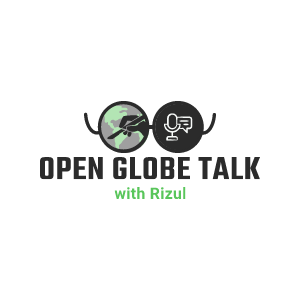February 19, 2022
Episode 20: Dr. Alessandro A Jammal, MD PhD
A discussion on
“The Amazon Rainforest: Indigenous eyecare”
Dr. Alessandro A Jammal, MD PhD
In this episode of Open globe talk, we have the esteemed pleasure of speaking with Dr. Alessandro Jammal who is a glaucoma specialist from Brazil and a current research scientist at Duke University. Dr. Jammal completed his medical school at Universidade de Uberaba (Uniube) and his Ophthalmology residency at Universidade Federal do Triângulo Mineiro (UFTM). He then completed a glaucoma fellowship at the prestigious Universidade Estadual de Campinas (UNICAMP, in Campinas, São Paulo) and a research glaucoma fellowship at the Duke University in conjunction with his PhD through Universidade Estadual de Campinas (UNICAMP, in Campinas, São Paulo).
Dr. Jammal has helped organize and create the Duke Ophthalmic Registry, a foundation for several exciting artificial intelligence studies and through which he has worked on and published several high impact research articles. Not only has Dr. Jammal excelled in academia, but he is also a compassionate global ophthalmologist. He has worked as a glaucoma surgeon in countries such as Nigeria, Kenya, Brazil and Haiti. With his incredible insight today, we will come to learn of a new perspective on eyecare in Latin America.
Key discussion points:
The decision to pursue Ophthalmology
Brazilian education system
No optometrists. Ophthalmologists work up all aspects of patient eye care
Getting started as a volunteer ophthalmologist for treating indigenous populations in the Amazon Rainforest
EDS: Brazilian Health Expeditionary
Healthcare mission work done once every 3-4 months
Started since 2003 and completed close to 9000 surgeries and over 100,000 procedures
First trip was a triage trip
Surgical expedition
Tribal diversity
Over 400 different tribes with different languages
During each expedition, EDS chooses tribes based on certain similarities
Communication with the tribes
Translator available
These are members of the tribe themselves that have been trained by the government to help communicate in basic Portuguese
Cultural sensitivity
Tribes have different costumes and ways to be approached
Prior to surgical expedition, community health workers to contact chiefs of tribe to receive approval
Can take months. Trust and understanding needs are key!
Unmet needs still in progress of being addressed
Geographically isolated tribes
Tertiary care hospitals are very far
Brazil has a public healthcare that has gaps in budget
i.e., cataract surgery needs very expensive devices
Compliance of indigenous populations
Extremely receptive
Excellent vaccination rates
Indigenous public health worker is able to relay any tribal healthcare needs over radio to help continue communication
Mobile surgical center
Force you to go back to simplest principles of medicine:
Importance of trust in clinician, giving best care to patient, & doctor-patient relationship
Pre-op room and post-op rooms have hammocks instead of hospital beds
Topics of indigenous eyecare needed to be addressed/studied further:
Cannot generalize: Tribes are culturally and geographically distinct
Diseases more prevalent:
Trachoma
Cataracts
Refractive errors
Distributing eyeglasses
Portable cameras for screening
Prevalence studies for eye diseases
Transformation of eye health post-intervention through the foundation
Estimated that in each expedition, all population in the tribe has been treated for cataracts for at least 5 years.
Increase life expectancy
Complication rates
Don’t complete surgeries with high complications
Igloos made to prevent any type of infection
Continuing global ophthalmology work during COVID
Brazilian glaucoma registry
Teaching courses in glaucoma tube shunts in countries such as Kenya and Nigeria
Important lessons
We need to have “a sense of community in a global scale that we really need to help each other”
Brazilian culture
Importance of knowing multiple languages
Gets you closer to the local population and is a humbling experience
Episode-based Resources:




